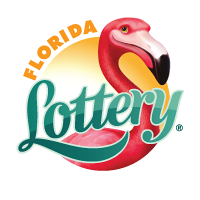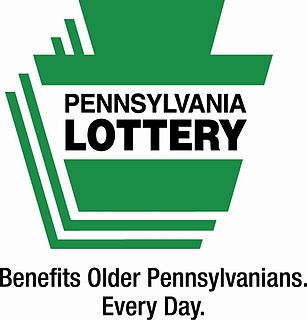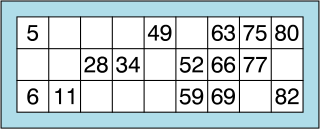
The Georgia Lottery Corporation, known as the Georgia Lottery, is overseen by the government of Georgia, United States. Headquartered in Atlanta, the lottery takes in over US$1 billion yearly. By law, half of the money goes to prizes, one-third to education, and the remainder to operating and marketing the lottery. The education money funds the HOPE Scholarship, and has become a successful model for other lotteries, including the South Carolina Education Lottery.

The Florida Lottery is the government-operated lottery of the U.S. state of Florida. As of 2022, the lottery offers eleven terminal-generated games: Cash4Life, Mega Millions, Powerball, Florida Lotto, Pick 2, Pick 3, Pick 4, Pick 5, Fantasy 5, Cash Pop, and Jackpot Triple Play.

The Pennsylvania Lottery is operated by the Commonwealth of Pennsylvania. The Lottery was created by the Pennsylvania General Assembly on August 26, 1971; two months later, Henry Kaplan was appointed as its first executive director. The Pennsylvania Lottery sold its first tickets on March 7, 1972 and drew its first numbers on March 15, 1972.
itbox is a networked gambling games terminal which is found in thousands of pubs, leisure centres and amusement arcades in the United Kingdom. Classified as a "skill with prize" (SWP) machine, each itbox terminal typically includes 25 different games. Each game costs 50p or £1 to play and lasts between 10 seconds and several minutes. From most of these games it is possible to win modest cash prizes. Although strictly the name 'itbox' refers only to Leisure Link-made terminals, the name is often casually applied as a genericized trademark to other SWP terminals such as Paragon SWP, Gamesnet, ind:e and Fatbox.

A scratchcard is a card designed for competitions, often made of thin cardstock or plastic to conceal PINs, where one or more areas contain concealed information which can be revealed by scratching off an opaque covering.
Lotteries in Australia include various lottery related products licensed by the Lott and Lotterywest Australian lottery companies. Lotteries operators are licensed at a state or territory level, and include both state government-owned, not-for-profit and private sector companies. Most major Lotteries have now moved into the online marketplace.

The Mint was a live, late night, interactive quiz show with celebrity guests and live studio contestants filmed on a large extravagant set designed to look like the inside of a mansion. The programme, which was dogged by criticism that its questions were ambiguous and arbitrary, aired on ITV1 and ITV2, Sunday to Wednesday. On 26 February 2007, ITV announced that The Mint would return to screens later in 2007, however an announcement on 12 September 2007 confirmed that the show, along with similar late night phone ins, would not be returning.
The North Carolina Education Lottery (NCEL) is run by the government of North Carolina. It was established after Governor Mike Easley signed the North Carolina State Lottery Act and the 2005 Appropriations Act.

The New Zealand Lotteries Commission, trading as Lotto New Zealand since 2013, is a Crown entity that operates nationwide lotteries in New Zealand. It was established in 1987 and operates under the Gambling Act 2003. Its oldest and most popular game is Lotto, which boasts a top prize pool of NZ$4 million. Other games include the four-draws-daily Keno, the daily Bullseye, and a variety of scratchcards and online games known as Instant Kiwi. Instant Kiwi may only be played by persons 18 years of age or older, under the Gambling Act 2003. Powerball and Lotto Strike are optional extras with every Lotto ticket.
The Wisconsin Lottery is run by the Wisconsin Department of Revenue and was authorized in 1988 by the state legislature. It is a member of the Multi-State Lottery Association (MUSL). Its games consist of Mega Millions, Powerball, Megabucks, Supercash!, Badger 5, Pick 3, Pick 4, All or Nothing, and scratch games. Since its founding, it has generated $4.6 billion for property tax relief for state residents.
The Virginia Lottery is an independent agency of the Commonwealth of Virginia. It was created in 1987 when Virginians voted in a statewide referendum in favor of a state lottery. The first ticket was sold on September 20, 1988. All profits from Virginia Lottery ticket sales go to K-12 public education, as required by Virginia's constitution. In Fiscal Year 2022, the Lottery's profits totaled more than $779.6 million, accounting for approximately 10 percent of school funding in Virginia. That brought total Lottery profits in Virginia to more than $14.5 billion.

The Mint is an Australian phone-in quiz show based on the British program of the same name, and broadcast on the Nine Network in selected areas in the late night time slot (post-midnight).

Bingo America is an American game show broadcast by Game Show Network. The series follows two contestants as they try to compete to win up to $100,000. Additionally, the series lets at-home viewers print bingo cards online that allow them to play along with the show to win small amounts of money for themselves.

Bingo Night Live is an interactive television programme featuring a free-to-play bingo game, broadcast in the United Kingdom on ITV & UTV. It aired between 4 June 2008 and 15 November 2008.
The National Lottery is the state-franchised national lottery established in 1994 in the United Kingdom. It is regulated by the Gambling Commission, and is currently operated by Camelot Group, to which the licence was granted in 1994, 2001 and again in 2007, but will be operated by Allwyn Entertainment Ltd from 2024.

Bingo is a game of probability in which players mark off numbers on cards as the numbers are drawn randomly by a caller, the winner being the first person to mark off all their numbers. Bingo, also previously known in the UK as Housey-Housey, became increasingly popular across the UK following the Betting and Gaming Act 1960 with more purpose-built bingo halls opened every year until 2005. Since 2005, bingo halls have seen a marked decline in revenues and the closure of many halls. The number of bingo clubs in Britain has dropped from nearly 600 in 2005 to under 400 as of January 2014. These closures are blamed on high taxes, the smoking ban, and the rise in online gambling, amongst other things.

The National Lottery is the state-licensed lottery operator in Ireland. Established in 1986 to raise funds for good causes, it began operations on 27 March 1987 when it issued its first scratchcards. It launched the weekly drawing game Lotto the following year, holding the first draw on 16 April 1988. The National Lottery now offers Lotto and Lotto Plus draws on Wednesdays and Saturdays, EuroMillions and Plus draws on Tuesdays and Fridays, and two Daily Million draws each day. Its other games include televised bingo, Millionaire Raffles, and online instant-win games. The minimum age to play all National Lottery games is 18.
National Bingo Night is an Indian game show, based on the American game show of the same name, produced by Urban Brew Studios which schedule to premiere on Colors TV on 23 January 2010. The show is hosted by Indian actor Abhishek Bachchan. The first celebrity guest on the show was Amitabh Bachchan, the father of the show's host.
The Biggest Game in Town was a British quiz show that aired on ITV1 between 10 September and 21 December 2001. The programme was broadcast live and was based on the game of bingo. It was presented by Steve Le Fevre